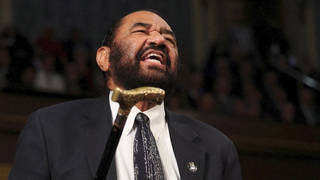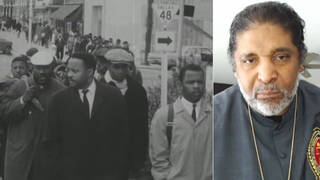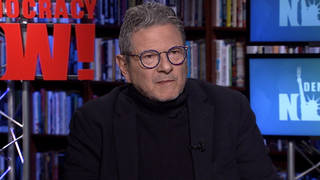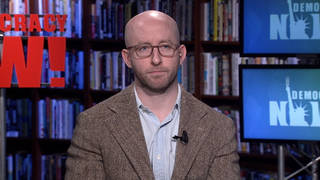
Topics
Democracy Now! spoke to striking TV writers on Tuesday outside of the New York offices of Peacock, NBCUniversal’s streaming service. It was the Writers Guild of America’s first picket line since the strike began. “These corporations are making billions of dollars off of our work, and we have members who can’t even afford healthcare because they are making less than $30,000 a year,” said Patrick Coker, a strike captain. “So all we’re asking for is a fair amount so that we could all eat.”
Transcript
AMY GOODMAN: Late-night shows went dark last night, airing reruns, as the first picket line of the Writers Guild of America strike formed Tuesday in front of the offices of Peacock, NBCUniversal’s streaming service. Democracy Now! spoke to some of the strikers.
PATRICK COKER: These corporations are making billions of dollars off of our work, and we have members who can’t even afford healthcare because they are making less than $30,000 a year. So all we’re asking for is a fair amount so that we could all eat.
It starts with the word on the page! Everything starts with the word on the page!
One of the main things that writers live off of is called residuals. We do our work, but corporations make a profit off of every time it’s showed. So every time it’s showed, we should make some money off of it. But corporations, especially the streamers, feel that we shouldn’t. So what winds up happening is we get paid originally, but every time as they continue to make profit, they keep that profit. They don’t share with the people who helped to make the profit. Not only the writers, the directors, the actors, all the stage people, everybody, the PAs, everybody should share in this.
STRIKERS: What do we want? Contracts! When do we want it? Now! What do we want? Contracts! When do we want it? Now!
PATRICK COKER: They use an algorithm to take our work and turn it into something different. But the thing about it, ChatGPT cannot create anything new. Everything it creates comes from something that already exists. So they’re taken our words, feeding them into the machine, and coming out with a mixture, a mash of it, and trying to sell it to the public. And the way — then, when they do that, they feel they don’t have to pay us.
STRIKERS: Hey! Hey! Ho! Ho! Corporate greed has got to go! Hey! Hey!
STEPHANI DE LUCA: The Writers Guild of America has always been on the forefront of negotiating with the studios when it comes to streaming and internet and all these things that they would rather us not talk about because it helps them siphon off more profit. In 2007, we tackled the issue of streaming. We saw it was coming down the pike. And it’s been 16 years since then, and we, as writers, are worse off now than we were before.
STRIKERS: Get up! Get down! New York is a union town! Get up!
STEPHANI DE LUCA: Profits are at an all-time high in this industry. They have the money. They have — CBS is putting $1.4 billion into a new stage facility in Los Angeles. But I guess 'cause that's in a separate account from what they would pay their labor, they can tell us they don’t have the money to pay us.
STRIKERS: Ho! Ho! Corporate greed has got to go! Hey! Hey! Ho! Ho!
MELISSA SALMONS: Everything that we ask for, the $426 million, could be paid with David Zaslav’s salary and Ari Emanuel’s salary, and still leave them with $63 million each.
JUDY TATE: I’ve been in the guild since 1990-something. What is this? Oh gosh, 2023. I think that’s a long time. And it really has changed. This golden age of television has really been created on the backs of writers. And I have seen a change from an industry that allowed a writer to have a middle-class life, maybe buy a small house — I’m talking about average writers; I’m not talking about, you know, people who are making a ton of money, but the average workforce — and I’ve seen that shrink and shrink and shrink and go away. And I feel that the young people who are out here today, like when I was out here 15 years ago, they’re making inroads so that we have covered work and our industry can support our families in the future.












Media Options